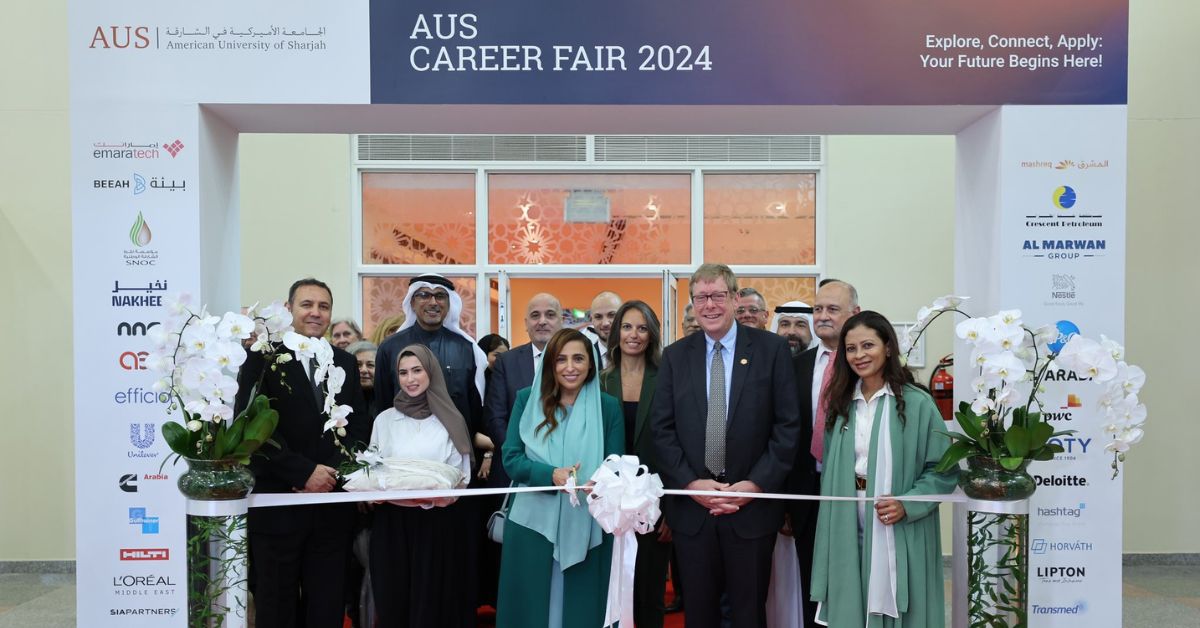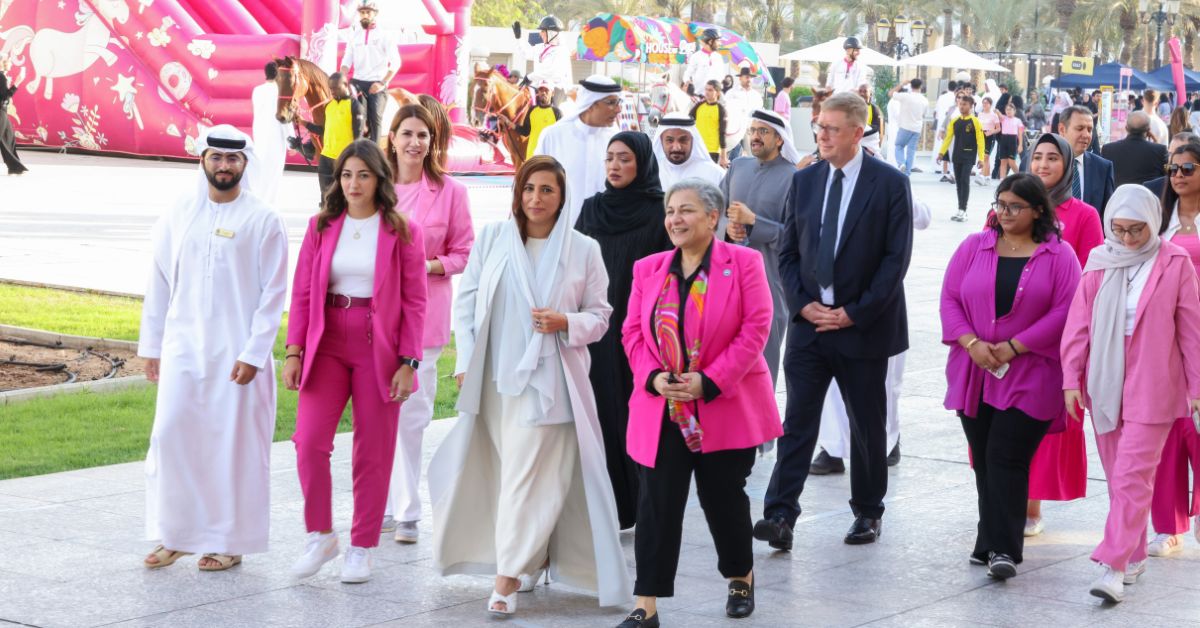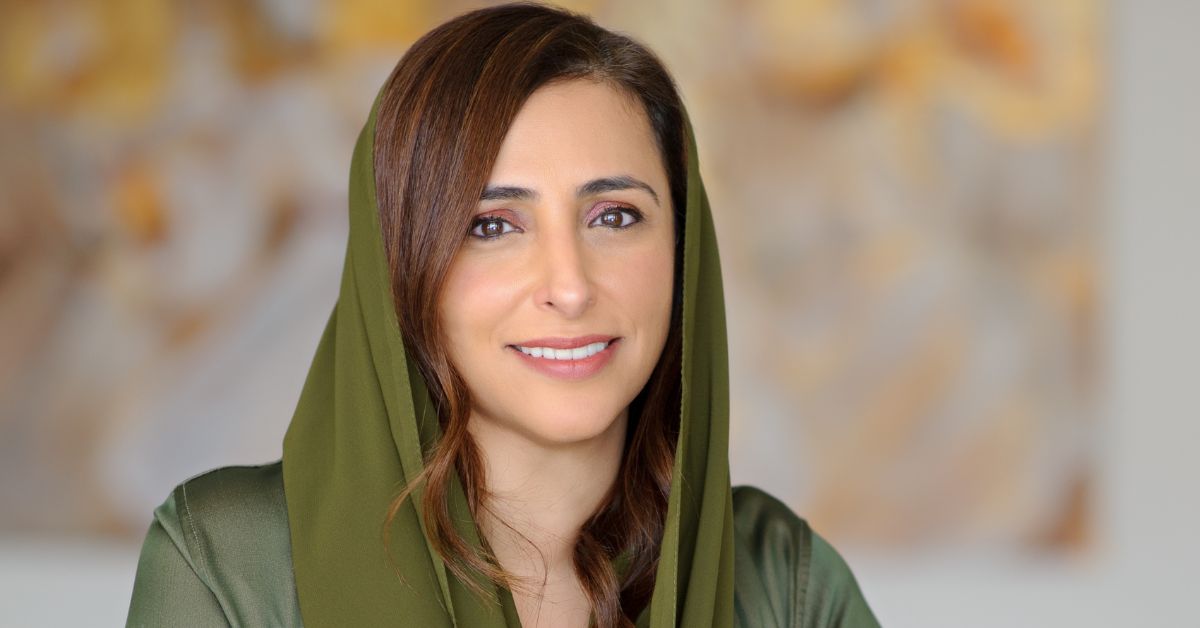SHARJAH — As the world celebrates International Women’s Day, Sheikha Bodour Bint Sultan Al Qasimi stands out for her dedication, resilience, and unwavering commitment to excellence, serving as an inspiration of hope for future generations of women leaders.
In an exclusive interview with Sheikha Bodour, President and Chairperson of the Board of Trustees of the American University of Sharjah (AUS), TRENDS explores her remarkable journey to leadership and her vision for empowering Arab women in various fields. An icon in her own right, Sheikha Bodour’s story is one of passion, determination, and unwavering commitment to education, cultural engagement, and women’s empowerment.
From her earliest days, Sheikha Bodour was captivated by the transformative power of education and the written word. Inspired by the stories and books of her childhood, she embarked on a journey that would see her become a prominent figure in the worlds of publishing, education, and technology. Her dedication to lifelong learning and cultural understanding laid the groundwork for her illustrious career, culminating in her current role at the helm of AUS.
Throughout her journey, Sheikha Bodour has championed initiatives that bridge the gap between education and cultural exchange, firmly believing that knowledge fosters innovation and societal growth. In our conversation with Sheikha Bodour, we delve into the unique strengths Arab women bring to leadership positions, the challenges they face, and the role they will play in shaping the future. From societal expectations to funding disparities, Sheikha Bodour offers insights into the obstacles facing Arab women and proposes solutions to overcome them, including mentorship, training programs, and initiatives to promote gender diversity.
As a leader herself, Sheikha Bodour emphasizes the importance of fostering a culture of continuous learning and growth within organizations. By setting an example, providing access to learning resources, and encouraging collaboration, she ensures that her team is prepared for the challenges of tomorrow.
Excerpts:
Q: Can you share with us your journey to becoming the President and Chairperson of the Board of Trustees of the American University of Sharjah? What were some pivotal moments or decisions that led you to this position?
A: My journey to leading the American University of Sharjah (AUS) is the culmination of lifelong pursuits, a path shaped by seemingly minor choices that, like the flap of a butterfly’s wings, had a profound impact on my trajectory. It all began with the stories and books from my childhood that ignited a passion for lifelong learning and a deep commitment to the transformative power of education. This early love of literature and the humanities influenced my academic choices and laid the groundwork for my path towards education and cultural engagement.
Arab women leaders are undeniably formidable. Their leadership style often highlights the importance of family, community, empathy, and social responsibility.
Sheikha Bodour Bint Sultan Al Qasimi
For instance, my role in founding the Emirates Publishers Association, which later became a full member of the International Publishers Association, provided me with a profound understanding of the significance of global knowledge exchange and its impact on fostering cross-cultural understanding and collaboration. Throughout my career, I have had the privilege of contributing to initiatives that bridge the gap between education and cultural understanding, always motivated by the belief that education drives innovation and societal growth.
My dedication to promoting literacy and access to knowledge, as well as my efforts to support the next generation of leaders and entrepreneurs, have been guided by a vision to create a sustainable and knowledge-based economy. My position at AUS is a natural progression of this journey, offering me the chance to contribute to a community that values diversity, inclusion, and the pursuit of excellence in education and research. I am honored to be part of an institution that prepares students academically while also empowering them to be socially responsible and culturally aware leaders.
Q: As a prominent female leader in the Arab world, what motivated you to pursue leadership roles, particularly in the fields of education, publishing, and technology?
A: The desire to learn, grow, and effect meaningful change wasn’t initially a call to leadership but a thirst for knowledge that drove me forward. For example, founding Kalimat Group was venturing into the unknown world of publishing. Little did I know it would lead to me becoming only the second woman president of the International Publishers Association in its 126-year history and the first Arab and Muslim woman to do so. This progression from a passionate novice to a leader underscores the relentless pursuit of knowledge and its transformative power.
My insatiable curiosity drew me to the fields of education and technology, where I identified a unique opportunity to bridge the gap between knowledge creation (publishing) and knowledge dissemination (education) through technological innovation. Whether launching global initiatives like PublisHer to empower women in publishing or contributing to strategic efforts like the Sharjah Entrepreneurship Center (Sheraa), my aim has always been to leverage my platform to positively impact my community and champion diversity, inclusivity, the transformative power of knowledge, and innovation.

Q: What do you believe are some unique strengths that Arab women bring to leadership positions?
A: Arab women leaders are undeniably formidable. Their leadership style often highlights the importance of family, community, empathy, and social responsibility—qualities highly valued in today’s interconnected society. They skillfully navigate complex social and professional landscapes with remarkable resilience and adaptability, breaking through barriers in traditionally male-dominated fields such as technology, finance, and entrepreneurship. Their success in challenging environments underscores their determination, resourcefulness, and capacity for innovative thinking.
Moreover, Arab women leaders offer a distinctive cultural perspective, enriching the workplace with diverse viewpoints that lead to creative solutions and sustainable growth. This commitment to innovation extends outside the corporate sphere, as they advocate for education and lifelong learning, not just for themselves but for their communities as well. Their steadfast belief in the transformative power of knowledge is paving the path toward a more equitable and prosperous future.
Q: In your experience, what are some of the main challenges Arab women face in attaining leadership roles, and how can these challenges be addressed?
A: The status of Arab women has significantly advanced over the past decade, especially in regions like the UAE where women’s empowerment is a governmental focus. However, societal norms that limit women’s access to leadership roles remain a significant hurdle. Addressing this requires a cultural shift to recognize and value diversity in leadership.
Another obstacle Arab women encounter is the funding gap. Despite notable progress in the tech and business arenas, female entrepreneurs in the Arab world often face difficulties securing funding for their projects, which impedes their growth and leadership potential. Additionally, the technology gap poses another challenge. Limited access to technology and training restricts women’s participation in the tech sector, thereby narrowing their leadership opportunities in an increasingly digital world.
To tackle these challenges, providing mentorship, training programs, and networking opportunities is key. It’s imperative for both public and private sectors to collaborate on initiatives that promote gender diversity, offer leadership training for women, and support work-life balance. Such efforts are crucial for leveling the playing field and enabling Arab women to achieve leadership positions across various industries.
The status of Arab women has significantly advanced… However, societal norms that limit women’s access to leadership roles remain a significant hurdle.
Sheikha Bodour Bint Sultan Al Qasimi
Q: How do you envision the role of Arab women in leadership evolving in the coming years?
A: Arab women are solidifying their roles in traditional sectors like education and healthcare, while also making strides in technology, space, military, engineering, and entrepreneurship. The blend of digitalization, innovation, and a growing emphasis on diversity is creating ample opportunities for their leadership. Their unique perspectives and leadership styles are becoming increasingly recognized, propelling them into roles at all levels, from organizational to national and global stages, as societies move towards more inclusive and sustainable development. Their expanding presence in government roles is particularly impactful, offering balanced insights into strategic decision-making and shaping a future that benefits everyone.
With continued education, mentor support, and backing from their communities and policymakers, Arab women leaders will further unlock their potential, driving positive change on both local and global scales.
Q: As a leader, what steps do you take to foster diversity and inclusion within your roles?
A: My commitment to diversity and inclusion is deep-rooted, especially through initiatives like PublisHer, emphasizing the value of diverse perspectives. I aim to create environments that not only welcome but celebrate differences. This involves inclusive hiring practices, mentorship programs to exchange knowledge, and promoting a culture where every voice is heard and valued. Highlighting the accomplishments of underrepresented groups inspires and empowers others to aim high. My goal is to cultivate an ecosystem where everyone feels appreciated, driven, and able to contribute their best, thereby enriching our collective efforts and spurring innovation.
Q: What advice would you give to young Arab women aspiring to leadership positions, especially in male-dominated fields?
A: To the young Arab women eyeing leadership roles: you’re incredibly fortunate. You’re beginning your journey supported by the legacy of women who’ve broken barriers with their resilience and strength, opening doors in various fields, including those traditionally male-dominated. Embrace this legacy with pride and use it as a foundation to chart your own path. Don’t hide your heritage or identity; see your unique perspective as a strength. Be bold, determined, and steadfast, but also embrace your femininity. True strength lies in utilizing your unique attributes, not in imitating others.
Whether pursuing a meaningful career or taking the entrepreneurial route, it’s crucial to find mentors and allies who inspire and guide you. Surround yourself with individuals who share your vision and can provide invaluable insights.
Lead with passion, but remember: true leadership involves responsibility. Don’t simply chase high positions; instead, aim to create meaningful change in your community, country, or even globally. Throughout your journey, remember to be kind to yourself. Leadership is fraught with challenges, and self-doubt is common. Yet, remember, your potential is limitless. Ignite your inner fire and relentlessly chase your dreams.

Q: As a leader, how do you promote a culture of continuous learning and growth within your organization or sphere of influence?
A: As someone committed to lifelong learning, I lead by example, fostering a culture of continuous growth. This involves providing learning opportunities through various training programs and resources, using feedback as a tool for development, and celebrating learning milestones to motivate others. Encouraging cross-collaboration and curiosity enhances perspectives and fuels exploration. By integrating these practices into our organization’s core, we cultivate a dynamic learning environment that paves the way for success and future readiness.
Arab women are solidifying their roles in traditional sectors while also making strides in technology, space, military, engineering, and entrepreneurship.
Sheikha Bodour Bint Sultan Al Qasimi
Q: How do you balance your professional responsibilities with personal commitments, and do you have any tips for maintaining that balance?
A: Achieving work-life balance demands conscious choices and embracing flexibility. My priorities are quality time, creating meaningful moments, and being present with loved ones. I aim to inspire my children with ambition, resilience, and the significance of community service.
Effectively managing this balance involves prioritizing and setting clear boundaries to prevent work from overwhelming personal time. I use technology for efficiency but consciously disconnect to engage fully in personal moments. Nurturing hobbies and seeking support when necessary are vital. Recognizing that asking for help signifies strength has been key to maintaining a well-rounded life.
Understanding that balance is a continuous journey of personal growth, experimentation, and mindfulness helps adjust whenever necessary. This journey is dynamic, filled with learning and adaptation, serving as a reminder that it’s normal not to have everything perfectly figured out all the time.

